WHITE LOGISTICS
Page 21
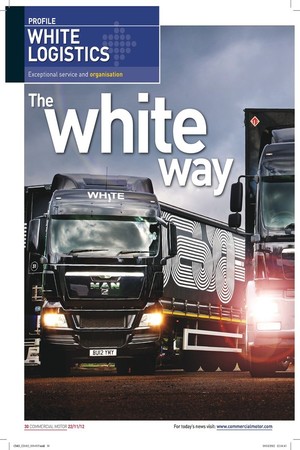
Page 23
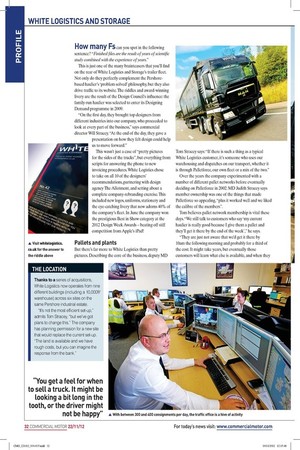
Page 24
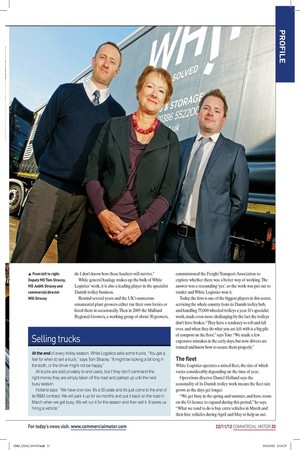
Page 25
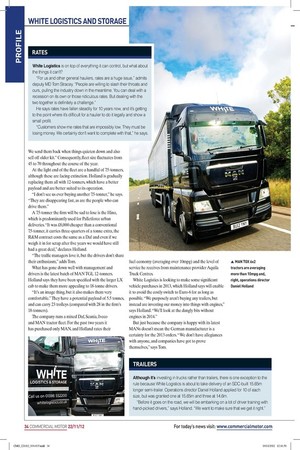
Page 26
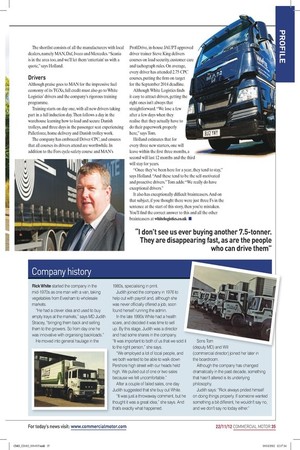
If you've noticed an error in this article please click here to report it so we can fix it.
Exceptional service and organisation How many Fs can you spot in the following sentence? “Finished files are the result of years of scientific study combined with the experience of years.” This is just one of the many brainteasers that you’ll find on the rear of White Logistics and Storage’s trailer fleet. Not only do they perfectly complement the Pershorebased haulier’s ‘problem solved’ philosophy, but they also drive traffic to its website. The riddles and award-winning livery are the result of the Design Council’s influence: the family-run haulier was selected to enter its Designing Demand programme in 2009.
“On the first day, they brought top designers from different industries into our company, who proceeded to look at every part of the business,” says commercial director Will Stracey. “At the end of the day, they gave a presentation on how they felt design could help us to move forward.” This wasn’t just a case of “pretty pictures for the sides of the trucks” , but everything from scripts for answering the phone to new invoicing procedures. White Logistics chose to take on all 10 of the designers’ recommendations, partnering with design agency The Allotment, and setting about a complete company-rebranding exercise. This included new logos, uniforms, stationery and the eye-catching livery that now adorns 40% of the company’s fleet. In June the company won the prestigious Best in Show category at the 2012 Design Week Awards – beating off stiff competition from Apple’s iPad!
Pallets and plants
But there’s far more to White Logistics than pretty pictures. Describing the core of the business, deputy MD Tom Stracey says: “If there is such a thing as a typical White Logistics customer, it’s someone who uses our warehousing and dispatches on our transport, whether it is through Palletforce, our own fleet or a mix of the two.” Over the years the company experimented with a number of different pallet networks before eventually deciding on Palletforce in 2002. MD Judith Stracey says member ownership was one of the things that made Palletforce so appealing, “plus it worked well and we liked the calibre of the members” .
Tom believes pallet network membership is vital these days. “We still talk to customers who say ‘my current haulier is really good because I give them a pallet and they’ll get it there by the end of the week’ , ” he says.
“They are just not aware that we’d get it there by 10am the following morning and probably for a third of the cost. It might take years, but eventually those customers will learn what else is available, and when they do I don’t know how these hauliers will survive.” While general haulage makes up the bulk of White Logistics’ work, it is also a leading player in the specialist Danish trolley business.
Rewind several years and the UK’s numerous ornamental plant growers either ran their own lorries or hired them in occasionally. Then in 2005 the Midland Regional Growers, a working group of about 30 growers, commissioned the Freight Transport Association to explore whether there was a better way of working. The answer was a resounding ‘yes’ , so the work was put out to tender and White Logistics won it.
Today, the firm is one of the biggest players in this sector, servicing the whole country from its Danish trolley hub, and handling 75,000 wheeled trolleys a year. It’s specialist work, made even more challenging by the fact the trolleys don’t have brakes. “They have a tendency to roll and fall over, and when they do what you are left with is a big pile of compost on the floor,” says Tom. “We made a few expensive mistakes in the early days, but now drivers are trained and know how to secure them properly.”
The fleet
White Logistics operates a mixed fleet, the size of which varies considerably depending on the time of year.
Operations director Daniel Holland says the seasonality of its Danish trolley work means the fleet size grows as the days get longer.
“We get busy in the spring and summer, and have room on the O-licence to expand during this period,” he says. “What we tend to do is buy extra vehicles in March and then hire vehicles during April and May to help us out. We send them back when things quieten down and also sell off older kit.” Consequently, fleet size fluctuates from 45 to 70 throughout the course of the year.
At the light end of the fleet are a handful of 7.5-tonners, although these are facing extinction. Holland is gradually replacing them all with 12-tonners, which have a better payload and are better suited to its operation.
“I don’t see us ever buying another 7.5-tonner,” he says. “They are disappearing fast, as are the people who can drive them.” A 7.5-tonner the firm will be sad to lose is the Hino, which is predominantly used for Palletforce urban deliveries. “It was £8,000 cheaper than a conventional 7.5-tonner, it carries three-quarters of a tonne extra, the R&M contract costs the same as a Daf and even if we weigh it in for scrap after five years we would have still had a great deal,” declares Holland.
“The traffic managers love it, but the drivers don’t share their enthusiasm,” adds Tom.
What has gone down well with management and drivers is the latest batch of MAN TGL 12-tonners. Holland says they have been specified with the larger LX cab to make them more appealing to 18-tonne drivers.
“It’s an image thing, but it also makes them very comfortable.” They have a potential payload of 5.5 tonnes, and can carry 23 trolleys (compared with 28 in the firm’s 18-tonners).
The company runs a mixed Daf, Scania, Iveco and MAN tractor fleet. For the past two years it has purchased only MAN, and Holland rates their fuel economy (averaging over 10mpg) and the level of service he receives from maintenance provider Aquila Truck Centres.
White Logistics is looking to make some significant vehicle purchases in 2013, which Holland says will enable it to avoid the costly switch to Euro-6 for as long as possible. “We purposely aren’t buying any trailers, but instead are investing our money into things with engines,” says Holland. “We’ll look at the dangly bits without engines in 2014.” But just because the company is happy with its latest MANs doesn’t mean the German manufacturer is a certainty for the 2013 orders. “ We don’t have allegiances with anyone, and companies have got to prove themselves,” says Tom. The shortlist consists of all the manufacturers with local dealers, namely MAN, Daf, Iveco and Mercedes. “Scania is in the area too, and we’ll let them ‘entertain’ us with a quote,” says Holland.
Drivers
Although praise goes to MAN for the impressive fuel economy of its TGXs, full credit must also go to White Logistics’ drivers and the company’s rigorous training programme.
Training starts on day one, with all new drivers taking part in a full induction day. Then follows a day in the warehouse learning how to load and secure Danish trolleys, and three days in the passenger seat experiencing Palletforce, home delivery and Danish trolley work.
The company has embraced Driver CPC, and ensures that all courses its drivers attend are worthwhile. In addition to the Fors cycle-safety course and MAN’s ProfiDrive, in-house JAUPT-approved driver trainer Steve King delivers courses on load security, customer care and tachograph rules. On average, every driver has attended 2.75 CPC courses, putting the firm on target for the September 2014 deadline.
Although White Logistics finds it easy to attract drivers, getting the right ones isn’t always that straightforward. “We lose a few after a few days when they realise that they actually have to do their paperwork properly here,” says Tom.
Holland estimates that for every three new starters, one will leave within the first three months, a second will last 12 months and the third will stay for years.
“Once they’ve been here for a year, they tend to stay,” says Holland. “And these tend to be the self-motivated and proactive drivers.” Tom adds: “We really do have exceptional drivers.” It also has exceptionally difficult brainteasers. And on that subject, if you thought there were just three Fs in the sentence at the start of this story, then you’re mistaken.
You’ll find the correct answer to this and all the other brainteasers at whitelogistics.co.uk ■
THE LOCATION
Thanks to a series of acquisitions, White Logistics now operates from nine different buildings (including a 10,000ft2 warehouse) across six sites on the same Pershore industrial estate.
“It’s not the most efficient set-up,” admits Tom Stracey, “but we’ve got plans to change this.” The company has planning permission for a new site that would replace the current set-up. “The land is available and we have rough costs, but you can imagine the response from the bank.”
Selling trucks
At the end of every trolley season, White Logistics sells some trucks. “You get a feel for when to sell a truck,” says Tom Stracey. “It might be looking a bit long in the tooth, or the driver might not be happy.” All trucks are sold privately to end users, but if they don’t command the right money they are simply taken off the road and parked up until the next busy season.
Holland says: “We have one now. It’s a 55-plate and it’s just come to the end of its R&M contract. We will park it up for six months and put it back on the road in March when we get busy. We will run it for the season and then sell it. It saves us hiring a vehicle.”
RATES
White Logistics is on top of everything it can control, but what about the things it can’t?
“For us and other general hauliers, rates are a huge issue,” admits deputy MD Tom Stracey. “People are willing to slash their throats and ours, pulling the industry down in the meantime. You can deal with a recession on its own or those ridiculous rates. But dealing with the two together is definitely a challenge.” He says rates have fallen steadily for 10 years now, and it’s getting to the point where it’s difficult for a haulier to do it legally and show a small profit.
“Customers show me rates that are impossibly low. They must be losing money. We certainly don’t want to complete with that,” he says.
TRAILERS
Although it’s investing in trucks rather than trailers, there is one exception to the rule because White Logistics is about to take delivery of an SDC-built 15.65m longer semi-trailer. Operations director Daniel Holland applied for 10 of each size, but was granted one at 15.65m and three at 14.6m.
“Before it goes on the road, we will be embarking on a lot of driver training with hand-picked drivers,” says Holland. “We want to make sure that we get it right.”
Company history
Rick White started the company in the mid-1970s as one man with a van, taking vegetables from Evesham to wholesale markets.
“He had a clever idea and used to buy empty trays at the markets,” says MD Judith Stracey, “bringing them back and selling them to the growers. So from day one he was innovative with organising backloads.” He moved into general haulage in the 1980s, specialising in print.
Judith joined the company in 1976 to help out with payroll and, although she was never officially offered a job, soon found herself running the admin.
In the late 1990s White had a health scare, and decided it was time to sell up. By this stage, Judith was a director and had some shares in the company. “It was important to both of us that we sold it to the right person,” she says.
“We employed a lot of local people, and we both wanted to be able to walk down Pershore high street with our heads held high. We pulled out of one or two sales because we felt uncomfortable.” After a couple of failed sales, one day Judith suggested that she buy out White.
“It was just a throwaway comment, but he thought it was a great idea,” she says. And that’s exactly what happened. Sons Tom (deputy MD) and Will (commercial director) joined her later in the boardroom.
Although the company has changed dramatically in the past decade, something that hasn’t altered is its underlying philosophy.
Judith says: “Rick always prided himself on doing things properly. If someone wanted something a bit different, he wouldn’t say no, and we don’t say no today either.”










































